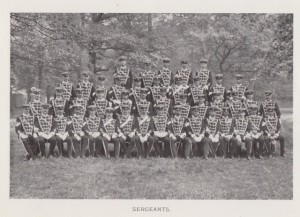Sutton Coalfield 23/11/1914
Seven weeks ago today we came here to commence our training in a spirit of confident anticipation determined to do great things. We were enthusiastic, light hearted, on the surface like boys off for a holiday. We.., we know now what we only dimly dreamed of then, that the work is hard and sometimes monotonous; but that grand spirit has not departed from among us-rather has it developed and expanded. We are boys still, ready for fun when work is over, bubbling over with joking and laughter, singing and shouting songs and greetings as we march and march and march. Work is never shirked; when grumbling occurs it is usually when some officer is slack, or because we are about waiting orders. Any really serious grind is tackled with grit: not the slightest difficulty is experienced in getting the men to put their backs in to the job.
Practically everyone now knows Squad Drill and Company Drill inside out, so we only occasionally have these, the major portion of the time being spent in Field Operations. We practice various forms of Attack and of Defence; we fight Advance Guard and rear Guard Actions; we are familiar with Outpost work and with the difficulties of finding the way through wooded country. We know how to use ground in attacking, how to take ‘cover’ – how, for example, to hide behind a cabbage or tuft of grass. We are learning to use our eyes and ears at night, finding out how to see without being seen, and, in general, becoming efficient soldiers, surely and steadily.
We now have a bugle band in the Battallion and this provides additional stimulation on our route marches. I say ‘additional’ stimulation because we previously had, and still have, one great stimulus to marching in the shape of marching songs. These are numerous and (to be polite) varied. The is a sad ditty about two grass-hoppers who sat upon two other grass-hoppers backs; there’s the charming refrain about:-
Mrs Porter
And her lovely daughter
Who washed her neck in soda-water
And so she ought-ter
Tipperary of course we have, and Fall in and Follow in. Also, The Soldiers of the King and We all Come Marching Home Again. Then there’s the swinging chorus about ‘Otto’
The girls call me Otto
What oh!
They know that my heart never closes
If you think you’d like a pot-oh
Put a penny in the slot-oh!
Use the motto of Otto
Of Roses
In addition to these songs some Sections have adopted different cries which they use on every possible occasion. One section, for example, has adopted the call: “Zara-a. Zar-a, fiddly on pom” Brainy isn’t it? But it keeps the step going anyhow. My section has adopted the sneeze as its very own! At a given signal each chap shouts several times one or other of words like “Rasher”, “Rusher”, “Risher”, “Roosher”, etc. This gives the effect of a terrific sneeze.
In talking about route marches (rout is the Army pronunciation) I may mention one or two little incidents which may interest. In passing one house we were several times greeted by a lady who stood on her doorstep and waved her handkerchief while the whole line of us passed. Soon we got to look out for her when we went that way, and now every time we pass we sing “Here we are, here we are, here we are again”, and all wave our handkerchiefs. It is quite a sight to see a forest of handkerchiefs waving at once. The lady now has a flag in one hand and her handkerchief in the other!
On our route marches we frequently meet members of the second battalion and greet them as2Jolly Old Seconds”, their invariable reply “Jolly Old Firsts”. These greetings are indicative of the excellent spirits prevailing between the rival Battalions. They will be heard yet on battlefields.
I personally enjoy the route marches very much and can do the whole distance of 10 miles without feeling even tired. The other night I di my firing on the miniature range after a 10 mile route march, and got on the target with every shot. I have now fired three ‘rounds’ of five shots each, have hit the target every time and scored out of a possible 25 points 18 the first time, 19 the second time and 20 the third time.
A slight change has recently been made in my Section, Jack Reeves being replaced by 798, Lance-Corporal Taylor. Jack Reeves has been put in charge of Section of PAltoon 13 though he is still a Lance-Corporal. Lance-Corporal Ward is in his section while Lance-Corporal Bacon has charge of Section 4 of the same platoon. So that we four friends are still together in the same platoon- THE PLATOON, No.13.
Private papers of Captain A G Osborn 1914
Recording his experiences as a private during the formation and initial training of the 14th (1st Birmingham) Battalion Royal Warwickshire Regiment.
